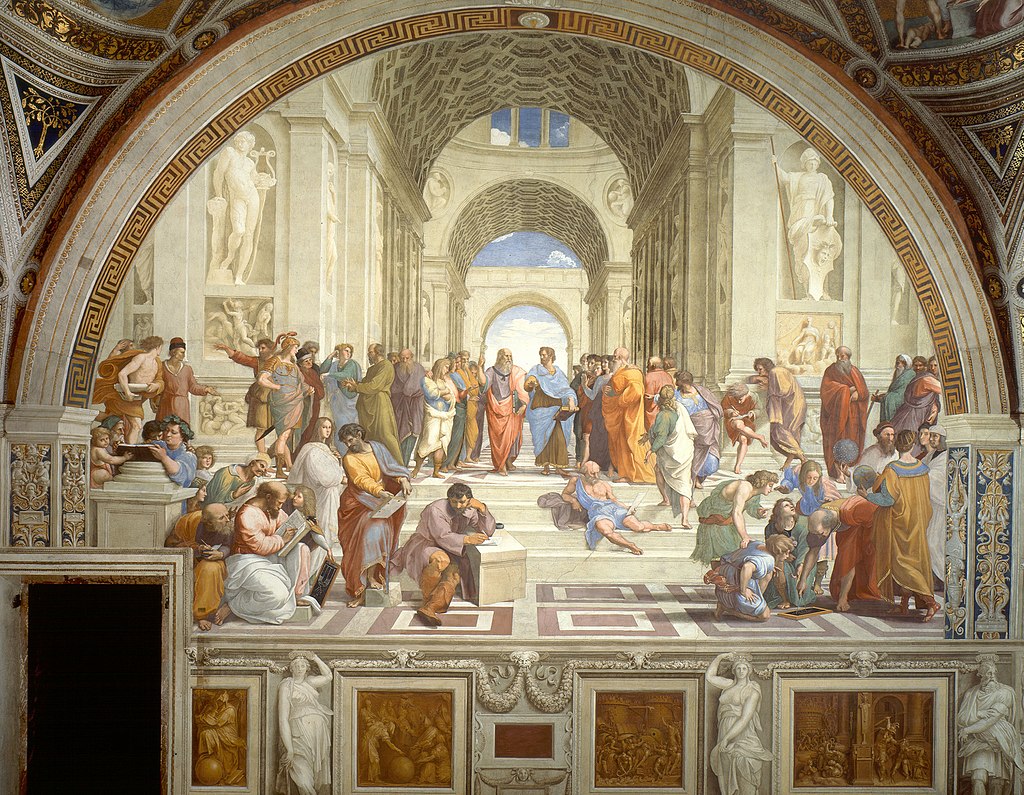Above photo: The School of Athens, Raphael, 1509-1511, Public domain, via Wikimedia Commons
“Let no one be slow to seek wisdom when he is young nor weary in the search of it when he has grown old. For no age is too early or too late for the health of the soul.” – Epicurus
Today is World Philosophy Day. Philosophy is incredibly important to study and become familiar with. Philosophy is the study and search for truth. It’s about living well. It seeks to answers questions about the best decisions and actions we can take on an individual level. Particular schools discuss how those decisions impact society. Looking at philosophy from this perspective – how could any study be more prescient or consequential? Below, I’ve linked to four practical essays on how to incorporate ancient wisdom into your modern life.
At its core, philosophy is about living well; about developing systems to discover the truth, then implementing that truth into your daily life. The focus of philosophy – like psychology – is the individual’s role. Society is composed of millions of individuals, each doing their best to make the wisest, most profitable decisions they can. What is good for the bee is good for the hive, as Aurelius wrote.
Ancient philosophy is the birthplace of much of Western culture. From the Republic of Plato, to the Socratic method of questioning, to the austere Stoic attitude highly prized in business and competition of all kinds, the ancient world continues to shape and mold the modern world.
Consider these four keys to living well, passed down from ancient philosophy:
Moderation
Epicurus spoke out against pure hedonism:
“By pleasure we mean the absence of pain in the body and of trouble in the mind. It is not an unbroken succession of drinking-bouts and of merrymaking, not the satisfaction of lusts, not the enjoyment of the fish and other delicacies of a luxurious table, which produce a pleasant life; it is sober reasoning, searching out the motives of every choice and avoidance, and banishing those beliefs through which the greatest disturbances take possession of the soul. Of all this the greatest good is prudence. For this reason prudence is a more precious thing even than the other virtues, for a life of pleasure which is not also a life of prudence, honour, and justice; nor lead a life of prudence, honour, and justice, which is not also a life of pleasure. For the virtues have grown into one with a pleasant life, and a pleasant life is inseparable from them.”
Further,
“The Greeks, and specifically Plato in Republic, especially encouraged moderation with respect to food, sex, drink, and money, cautioning that following one’s passions about these things would lead to a shallow and unfulfilled life. To some degree, they are absolutely right. Gluttony, drunkenness, wanton promiscuity, and greed each come with their own set of problems. But at the same time, who wants mediocre food, relationships, drink, or bank accounts? Again, focus becomes the separator. Focusing on the wrong things leads to a wasted life.”
From: On Moderation
Self-control
“ Nothing will stand in the way of your acting justly, and soberly, and considerately.” – Marcus Aurelius
“Remind yourself that you can always do the just and considerate thing. We often call this being the bigger person, when really, it’s just acting decently, and not emotionally. When we don’t have the noise of ego or emotion driving us to react one way, we are then free to use reason and exhibit humility in our thoughts and actions.”
From: Why Stoicism is So Darn Popular Right Now
Seeking Knowledge
“To know, is to know that you know nothing. That is the meaning of true knowledge.” —Socrates
Start from humility and a simple desire to learn and improve.
Recommended: Improve Your Inputs for Better Output
Communicating Well
“Aristotle’s display of understanding human psychology, linguistics, and oration, among others, illustrates how rewarding and useful it is to learn across disciplines. By learning principles from different sciences and arts, we can extrapolate patterns and begin to make creative choices, as Aristotle does in this text. Finally, Rhetoric explicitly shows that choosing the right word at the right time is a skill which must be practiced, rather than just a gift some people are blessed with.”
From: Want to Communicate Clearly? Read Aristotle’s Rhetoric – Here’s Why
On this World Philosophy Day, I encourage you to spend some time reading the ancients and contemplating the good life. Whether you spend some time journaling, or plan to explore the many schools of philosophy, I challenge you to consider reading the wisdom passed down from generations of learners and leaders just like yourself.




